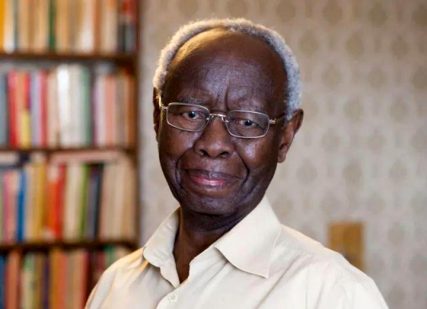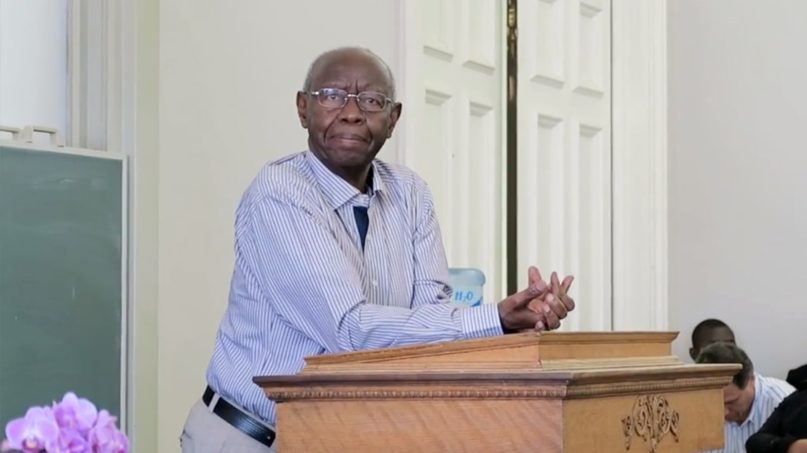(RNS) — John Samuel Mbiti, longtime professor of ecumenism and mission at the University of Bern and an ordained priest in the Anglican Communion, died recently.
In every generation there rises a mwalimu, someone who completely transforms the pace and trajectory of a scholarly tradition. The bravery and brilliance it takes to accomplish such an enormous task are not only rare but are bound to leave a mark on scholarship forever. Such scholars pave the way for those who will come after them, encouraging them to follow in their footsteps and build on the foundation they have laid. Mbiti was one such scholar and his research and teaching have irrefutably shaped the academic study of African religion as we have come to know it today.
Few scholars in the field of African studies, religion and African philosophy can confess to being unfamiliar with Mbiti’s work. Most Africanists and scholars of Africa will have at some point either read his work or engaged it in one way or another in their own research. Mbiti’s indelible influence on the field reaches far and wide, demonstrating the extraordinary impression his pioneering spirit and scholarly determination have left on us all.
Born in Mulango in Kitui, Kenya, on Nov. 30, 1931, he was the eldest of six children. Growing up in the colonial era, a young Mbiti was trained in missionary-founded schools and became a devout Christian. As noted in the 1993 book “Religious Plurality in Africa: Essays in Honour of John S. Mbiti” (which I co-edited), “This early inspiration and education made a deep imprint on Mbiti’s life and was to influence his future career and academic interests.” Mbiti’s academic career took him to numerous academic institutions both on the continent and around the world, and his passionate commitment to ecumenicity and the development of African theology spurred him on to work with like-minded institutions and organizations throughout his life.

John Samuel Mbiti. Courtesy photo
Mbiti was committed to expanding the lens through which Africa, its peoples, its knowledges, its religions and its culture were studied, and he stayed so committed until his final breath. Mbiti was ahead of his time. He sensed the danger in compartmentalizing African systems of knowledge and articulated a kind of unity between African thought systems espoused through philosophy and African spirituality. His most famous book, “African Religions and Philosophy” (1969), opened the way for the study of religions and philosophy in African, European and North American universities. His numerous publications have become durable classics in the fields of African Christianity and theology and continue to be staples in classrooms where African religious traditions are taught.
It is appropriate to call Professor Mbiti the grandfather of the scholarly study of African religious traditions. The academic pursuit of African indigenous religion began through his cutting-edge research and teaching at Makerere University. He wasn’t alone in this. Scholars of his generation, including Bolaji Idowu, Kwame Bediako, Gabriel Setiloane and others, formed a cohort that sparked the fire of the study of African religion and philosophy during the post-independence period on the continent. The irony of it all was that most of these pioneers, including Mbiti, were gentlemen of the cloth, trained in British centers of theological studies. Upon returning home, however, they were pressed by their students and the reality of their different cultural contexts to produce curriculums more attuned to African society. Mbiti’s “African Religions and Philosophy” is a testament to this change in sensibilities.
The theological vitality of Mbiti’s work was very much informed by his Christian worldview and his deep connection to his faith. Mbiti’s genuine Christianity and gentle spirit were a big part of how he existed in the world. He was devoted to his wife and children and to the church as deeply as he was to the pursuit of scholarship. Many who met him tell of his kind nature and how beloved he was by his students and colleagues. Mbiti never made a clear distinction between research, teaching and service. He was a skilled mentor, a trait that he was well known for and that encapsulated his work as the director of the ecumenical institute in Bossey, Switzerland. He regularly invited young scholars to the institute for training and opportunities to participate in significant ecumenical conversations. While attending a two-week seminar there, I remember Mbiti sitting under a tree in the courtyard interacting with students during breaks from our meetings. I will never forget the image of students, sitting around him in rows, waiting for a chance to talk to him. He would receive each one in turn and, without rushing, offer his advice and commentary on their work.
In 1993, my colleague Sulayman S. Nyang and I compiled essays in his honor to recognize Mbiti’s tremendous contributions to African religious scholarship. We wanted to draw the attention of young scholars to his work, recognize the weight of his contributions and, somewhat uniquely, highlight the significance of his personality for the academic study of religion. Mbiti’s mode of scholarship showed us a way that knowledge humanizes us. He thought and lived in a harmonious way. When we requested a photograph to use for the festschrift, he insisted on giving a picture he had taken with his family. For, as he told us, whatever he had to offer others came by way of the care and support he also received from others.
In the edited volume we finally produced, another senior colleague, Ogbu Kalu, wrote of Mbiti that the corpus of his works, even then, was “an unparalleled achievement in academics and worthy of a four-day palm-wine-drinking celebration.” Indeed, nearly 30 years later this still rings true. Mbiti will be remembered as a preeminent African scholar whose endeavors are unparalleled in the academy and worthy of the highest regard. The world is truly poorer with him gone.
We mourn together with Mbiti’s family, our Kenyan colleagues and the beautiful people of Kenya in general. May we all be comforted and may Mwalimu’s soul rest in peace.
(Jacob K. Olupona is professor of African and African American studies in the Harvard Faculty of Arts and Sciences, with a joint appointment as professor of African religion at Harvard Divinity School. He is the author or editor of numerous books and articles, on topics including religious pluralism, African immigrant religious communities, world Christianity and the globalization of African religious traditions. The views expressed in this commentary do not necessarily reflect those of Religion News Service.)





